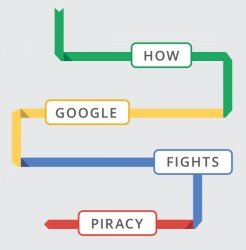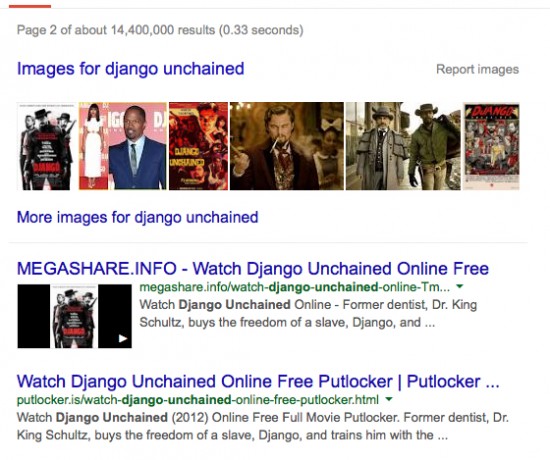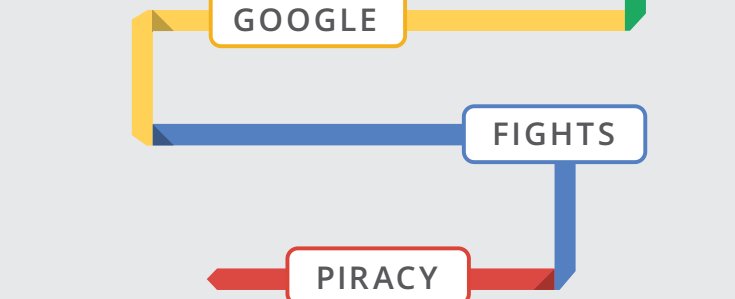Will Google Get it Right This Time?
 Two years ago, in August 2012, Google said that it would use the data compiled in its transparency report to penalize sites that were the subject of a large number of copyright complaints.
Two years ago, in August 2012, Google said that it would use the data compiled in its transparency report to penalize sites that were the subject of a large number of copyright complaints.
However, a year after that, the Motion Picture Association of America released a study that indicated that the “pirate penalty” had caused little to no reduction in the rankings of infringing sites. In fact, the amount of traffic sent to the most heavily infringing sites dropped by so little that it was not considered statistically significant.
But now Google has come back again and said, in an updated “How Google Fights Piracy” report, said that it is updating those algorithms to make the effect more noticeable and is also releasing new ad formats that link directly to legal music and video series when using keywords such as “Download”, “Free” and “Watch”. Google also said that it will tweak its autocomplete to remove terms that receive a large number of copyright complaints.
But will these changes have a serious impact on search results and will the end result be more searchers being directed to legitimate alternatives? That’s a tough question, especially without the changes being rolled out, but those who are skeptical certainly have a lot of reason to be.
Google’s Shrug
As Google explained what it was going to do, it also explained why it feels the steps aren’t important.
For much of Google’s report, at least the part dealing with Google search, Google downplays the role that its search engine and other properties play in driving traffic to piracy-oriented sites. It notes that search engines account for less than 16% of all traffic to sites like The Pirate Bay and points to several instances where pirate site operators have claimed that they don’t need search traffic at all to sustain themselves.
These findings actually mirror those from the MPAA study, which found that search engines sent about 19% of the traffic to pirate sites, a difference of 3% and easily explained by differences in methodology or even statistical anomaly. However, according to the MPAA study, over half of those people are using generic terms, meaning that approximately 10% of the traffic to pirate sites are potentially legitimate customers directed there by search engines.
That’s not just a significant amount of traffic to pirate sites, but a significant blow to content creators. However, Google never mentions that many of the people it has directed to pirate sites were likely customers, unlike those who access pirate sites directly or through other means. In short, Google may only direct a small percentage of traffic to pirate sites, but it’s potentially the most valuable percentage to creators.
While Google was quick to point out that pirate terms are much less common than generic ones, it also failed to acknowledge that it has directed viewers to pirate sites, including ones well known in the Google Transparency Report, on those generic terms.
For example, searching for “Django Unchained”, an actual example in the report, lists two illegal download sites at 11 and 12. The first page, other than ads in the sidebar, contain only links to the official site, Amazon and reviews. Other legitimate sources, including iTunes, Google Play, Vudu, etc. are not listed. In short, the first two sites that let you view the film, other than Amazon, listed are pirate ones, for the generic term.

In short, even as Google is offering an olive branch to content creators, it’s also lecturing on how it shouldn’t have to do anything at all and why it isn’t harming creators, even if it means ignoring evidence that there are still problems. This raises serious questions about Google’s resolve. After all, it was evident a year ago that Google’s previous changes weren’t working, yet it took them until now to make adjustments.
Still, Google is coming with genuine offerings, so perhaps something good will come of them.
What Google is Offering
On the issue of search, Google is offering three separate things:
- Further Algorithm Changes: Google said it will further tweak it’s anti-piracy algorithm to make the effect more pronounced, further demoting sites that receive a large volume of copyright notices.
- Autocomplete Changes: Now, terms that receive a large volume of takedown notices will be removed from autocomplete, meaning that users will not see autocompletes for piracy-oriented keywords.
- Promoting Legitimate Services: Finally, Google is going to make a stronger effort to promote legitimate services with ads at the top of search results that link directly to legitimate sources including Google Play, Amazon, iTunes, Spotify, Rhapsody and more.
The first two are basically improvements on changes that Google already had tried to make.
As discussed earlier, the algorithm changes are just improvements on a change that Google made in 2012 that had little impact. However, around that time, Google made similar efforts to remove questionable keywords from autocomplete, including The Pirate Bay itself.
However, that too had a questionable impact as, earlier this month, Google added a custom search box for The Pirate Bay, complete with autocomplete searches. This tool enabled searchers to look for keywords just within The Pirate Bay directly from Google.
To be fair, the addition was automated and quickly corrected, but the fact it happened at all shows the limits of Google’s previous efforts to steer people away from The Pirate Bay and sites like it.
But in the end, it’s the third element that has generated the most interest. The ads, theoretically, will not only highlight legitimate sources for content and ensure that legitimate services are at the top. While it’s unclear if the ads will have the same impact and trust as Google’s organic terms, their strong presence can’t hurt.
So will these changes have a major impact? If Google gets everything right and ensures that both its algorithm and autocomplete efforts, work, they could. However, creators are right to remain skeptical until the changes have been seen.
Still, if you’re a smaller content creator, there isn’t much to cheer about. After all, these changes don’t really apply to you.
The Impact on the Small Creator
While “The Expendables” and “Lorde”, a movie and artist mentioned in the Google report, may have something to cheer about if these changes work out, your average blogger, photographer, artist or author may not see much benefit.
The first reason is because it’s almost certain that the advertisements are going to be limited to large and well-known musicians and films. This makes sense because a small number of films and musicians make up the bulk of searchers. However, if you’re a creator trying to establish themselves, there likely isn’t going to be such an advertisement for you.
Second, the volume of DMCA notices required to trigger a demotion in Google is very high. Only the larger content creators will be able to afford the services (or have the need) to send that many notices.
The good news is that this, if it succeeds, will likely have some shared benefit if your content is widely pirated/shared on sites that are also targeted by creators with deeper pockets. If you see a different pattern of infringement than a Hollywood film or a major record release, you’re likely going to get limited benefit.
Still, don’t expect ads for legitimate purchase/viewing options or to have piracy-related search terms removed from autocomplete. Google has made it clear that these efforts are almost exclusively for larger creators and will probably have no impact on you.
Bottom Line
Personally, I agree with Google on several points. Search engines can not eliminate piracy (not that anything can) and, in fact, the search engines only play a relatively small role in feeding sites that are engaged in piracy.
Still, the role of search engines is important and Google both can and should do more. Further, those efforts can be made while protecting freedom of speech and building a better search engine.
But Google, at best, has been a dubious ally in the fight against piracy. While, in its report, it touts the “follow the money” approach to defeating piracy and its own actions in cutting pirate accounts, a study last year found that Google was the second most common supplier of ads on pirate sites.
While I’m cautiously hopeful that Google’s newest changes could bring about real, practical benefits to content creators, Google needs to admit that it’s missed real opportunities to bring about change.
It’s in the mutual interest of Google and content creators to work together. However, transparency doesn’t just mean outlining what you’re doing, but admitting your failures and mistakes.
Google’s report doesn’t do that and while it outlines some great steps if they work, it also seeks to minimize Google’s role, responsibility and problems. While the steps announced sound good, two of them have been promised before with little result.
If Google is going to convince creators it is a partner in battling piracy, it has to do more than make promises, it has to deliver on them and maintain effectiveness. Time will tell if Google manages to do that.
Want to Reuse or Republish this Content?
If you want to feature this article in your site, classroom or elsewhere, just let us know! We usually grant permission within 24 hours.
